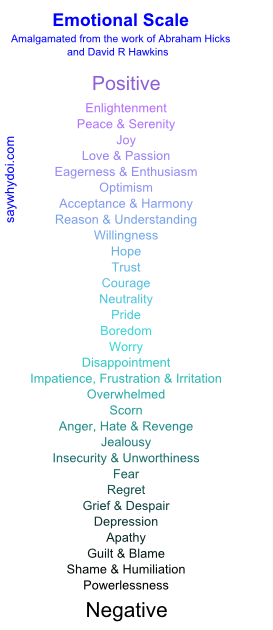Inspired by Abraham Hicks, here are a few thoughts on this topic of why we find ourselves in situations that annoy us, or find ourselves coming across people who irritate us:
 1.) Because you’re already vibrating near irritation:
1.) Because you’re already vibrating near irritation:
On the emotional scale, we often fluctuate from one set point to another at different points in our lives. During the times when we find ourselves attracting annoyances and irritation into our lives, it means that we’re vibrating round about those levels close to irritation already – teetering on the brink of it, often experiencing emotions like frustration, impatience, overwhelment, disappointment and / or worry. Once you deliberately pivot your thoughts more positively and uplift yourself to a more positive emotional state (eg around neutrality, courage, trust and higher); once you’re vibrating at a higher level you will not be able to rendez vous with irritation so often any more.
2.) Because what you see is a mirror for something in your vibration
If you look in more detail at *what* is irritating you – the specifics of it – it can be meaningful because it’s often reflecting back to you something that’s already active in your vibration.
For example: Say the situation is that you get irritated because you have someone in your life who is often pointing out every time you say something negative and is labelling you as a “negative nelly”. It’s not a coincidence that you’ve rendez voused with this experience. Any form of criticism tells you “you’re not doing a good job at something” or “you’re not good enough”, so at the core of it, it may be linked to low self-esteem and low confidence in yourself.
- – -
A few ways to pivot yourself in a more positive direction:
 a.) Concentrate on the positive aspects of the irritating person:
a.) Concentrate on the positive aspects of the irritating person:
If there’s a specific irritating person, focus on their positive aspects in particular to attract positive experiences in your interactions with them.
eg. Person X is good at his job. He’s really talented with numbers. I admire that he is great at focusing on something and seeing it through till the end. He has a strength to him when he doesnt give up easily. I like it when he laughs – it brightens and lightens the mood around us. etc etc
b.) Use positive self-talk to soothe yourself about your sensitive subjects
Make peace with the things that push your buttons by pivoting positively about those subjects that you’re sensitive about. Train yourself and practice being easier about things, being kinder to yourself about them and doing lots of positive self-talk about them in a wobble-free way. Eventually you can train your vibration to a higher level on these topics until they will no longer push your buttons.

eg. Say your sensitive spot is making mistakes and being picked on for doing something wrong. You could pivot that by saying something like this: Everyone makes mistakes sometimes. I would like to believe that people are generally kind and would allow for the fact that everyone makes a mistake sometimes. I know that although I may have made a mistake, I’m still a good worker overall. I know I am analytical and good with words. I get on well with people. There are so many good things about me! So this little mistake is really a small, insignificant thing in the large scale of things. etc etc
Tip for pivoting: Self-talk with the words “I would like to believe that…” or “I would like to trust that…” is softer and easier to say to yourself convincingly than saying “I believe that…” or “I trust that…” or “I know that…” which may be empty words. It’s important to find words you can believe and feel to be true for this method to work.
